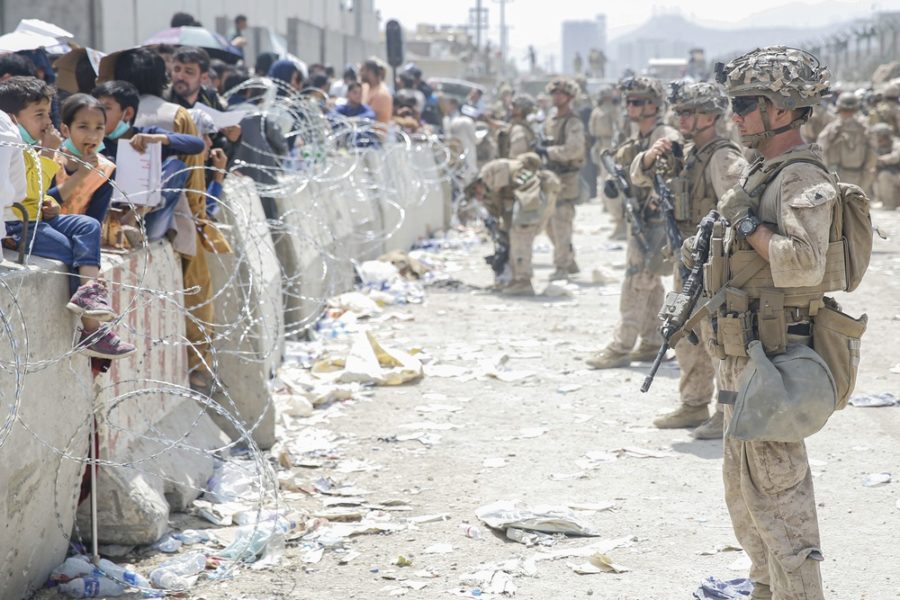Americans’ trust and confidence in the U.S. military has declined precipitously in 2021, according to the results of a survey. Experts lay the blame on increasing political polarization and the fallout from this summer’s turbulent withdrawal from Afghanistan.
The Ronald Reagan Presidential Foundation and Institute’s National Defense Survey released Dec. 1 found that just 45 percent of those polled said they had “a great deal of trust and confidence” in the military as an institution. That marks a 25-point drop from November 2018 and an 11-point drop since February 2021.
Just three years ago, 70 percent of those surveyed said they had a great deal of confidence.
The overall trend over the past few editions of the survey has been downward, going from 70 percent in 2018 to 63 percent in 2019 to 54 percent in February 2021. But the most recent drop is the biggest, recorded just two months after many Americans were shocked by reports from Afghanistan that included video of civilians breaching the airfield at Hamid Karzai International Airport, desperate to flee the Taliban and clinging to the side of Air Force aircraft.
“You can’t underestimate the searing images from the Afghanistan withdrawal and [their effect on] people’s trust in the institution,” retired Army Maj. Gen. John G. Ferrari, now a senior fellow at the American Enterprise Institute, told Air Force Magazine. “So I think that had a very large, large effect. And so I think that the second thing will be, OK, does time kind of dim that image, or is this kind of a new normal for the military?”
Retired Marine Col. Mark F. Cancian, now a senior adviser with the Center for Strategic and International Studies’ International Security Program, said he thinks reversing the fallout from the Afghanistan withdrawal, absent any other damaging incidents, will take a year.
“There could even be events where the military has an opportunity to shine—some foreign operation, maybe it could be humanitarian assistance or something,” Cancian said.
But it’s not the end of the Afghanistan War alone that contributed to lower public trust, experts said. For years now, pollsters and academics have noted declining public trust in institutions. The military has mostly been spared, actually building up trust after the Vietnam War and turning itself into one of the most trusted institutions in America. The creep of partisan politics, however, has become increasingly difficult to avoid.
The Reagan Defense Survey found that Republicans, Democrats, and independents all reported lower levels of confidence in the military. Republicans reported the biggest decline among those saying they have a great deal of confidence—a 17 percent drop from February and a 34 percent drop from 2018. By comparison, Democrats recorded drops of six and 17 percentage points, respectively, while independents had drops of nine and 28 points.
Republicans’ declining trust coincides with Republican lawmakers increasing criticism of military leaders for focusing on issues such as diversity, equity, and inclusion, as well as extremism in the ranks.
“If there’s continuing loss of trust in institutions, it is almost inevitable that the military gets dragged into that a little bit, because it is a factor with political polarization,” said Nathalie Grogan, a researcher with the Center for a New American Security. “And that is, to my view, the biggest problem with the declining trust, is that the military is being seen as a political institution. And that’s demonstrated with the very significant drop in trust in the military among political conservatives.”
The military has politicized itself in very few instances, Grogan said. Instead, civilian leaders and politicians have increasingly politicized the military. The result, she warned, is “increasing polarization and partisanship if civilian elected officials don’t make an effort to exclude the military—which they have not made that effort. They’ve been including the military in their partisan squabbles.”
Defense Secretary Lloyd J. Austin III, speaking in a taped interview with Defense One streamed online Dec. 7, also pointed to increasing partisanship as a cause for concern.
“The military doesn’t exist in a vacuum, and as you take a look at the landscape around the country, things have become a lot more partisan in recent years,” Austin said. “And if you look at what’s going on on various websites, that really adds fuel to some of that partisanship, but I think it’s very, very important that our military remain apolitical.”
Ferrari theorized that over roughly two decades of war, the public’s perception of the military allowed it to defy the trends of increasing polarization and decreased trust. With the war over, though, the military is now experiencing many of the same factors driving down trust in other institutions.
Potential Impact on Recruiting
While Ferrari and Grogan both noted that the armed services are starting from a much higher level of confidence when compared to others, the impact of these recent declines could be especially important when considering recruiting.
Recent surveys have shown today’s youth are less inclined to serve in the military. The Reagan National Defense Survey recorded declining trust among all groups, but the lowest levels were among those under 30 years old; more than 30 percent of the age group either said they had not much confidence at all or just a little confidence.
“If we see a downturn in recruiting because parents, influencers, no longer trust the institution, then we’re going to have a big problem, rapidly,” Ferrari said.
Pentagon Press Secretary John F. Kirby, asked about the survey during a press briefing Dec. 6, added that recruiting isn’t the only issue.
“The men and women who serve in this department come from homes and families all over the country, and so the American public’s perceptions of the United States military matters to us, not just from a recruiting perspective, although that’s valid, but also from a representational perspective,” Kirby said.
In order to reverse these trends, Ferrari argued, military leaders should look to keep the armed services out of the headlines and not get drawn into partisan politics. In particular, Grogan said, the military should focus on the National Guard and how the Guard works with the public.
“That would be a very significant first step to rebuilding trust in the military, because the National Guard is the part of the armed forces that civilians will have the most contact with,” Grogan said. “Active-duty troops, with very few exceptions, are not interfacing with the public, but the National Guard often does, and it’s been incidents with the National Guard that have been politicized over the past couple years.”
If nothing else, Cancian said, the latest survey should serve as a reminder that public trust is earned.
“The military has no right to being the top-regarded institution in the United States—it is something it has earned over the course of my professional life,” Cancian said. “When I started my professional life as a young Marine lieutenant, the military was at the bottom, and it’s taken them literally half a century of work to get to the top.”


